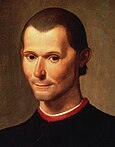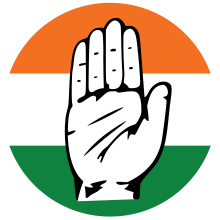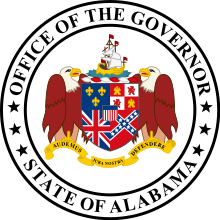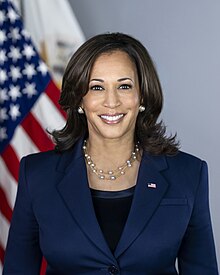| Main | Topics and categories | Tasks and projects |
The Politics portal
Politics (from Ancient Greek πολιτικά (politiká) 'affairs of the cities') is the set of activities that are associated with making decisions in groups, or other forms of power relations among individuals, such as the distribution of status or resources. The branch of social science that studies politics and government is referred to as political science.
Politics may be used positively in the context of a "political solution" which is compromising and non-violent, or descriptively as "the art or science of government", but the word often also carries a negative connotation. The concept has been defined in various ways, and different approaches have fundamentally differing views on whether it should be used extensively or in a limited way, empirically or normatively, and on whether conflict or co-operation is more essential to it.
A variety of methods are deployed in politics, which include promoting one's own political views among people, negotiation with other political subjects, making laws, and exercising internal and external force, including warfare against adversaries. Politics is exercised on a wide range of social levels, from clans and tribes of traditional societies, through modern local governments, companies and institutions up to sovereign states, to the international level.
In modern nation states, people often form political parties to represent their ideas. Members of a party often agree to take the same position on many issues and agree to support the same changes to law and the same leaders. An election is usually a competition between different parties.
A political system is a framework which defines acceptable political methods within a society. The history of political thought can be traced back to early antiquity, with seminal works such as Plato's Republic, Aristotle's Politics, Confucius's political manuscripts and Chanakya's Arthashastra. (Full article...)
Selected article
Niccolò di Bernardo dei Machiavelli (May 3, 1469 – June 21, 1527) was an Italian diplomat, political philosopher, musician, poet, and playwright. He is a figure of the Italian Renaissance and a central figure of its political component, most widely known for his treatises on realist political theory (The Prince) on the one hand and republicanism (Discourses on Livy) on the other. These two written works, plus his History of Florence commissioned by the Medici family, were published posthumously in 1531. After the ousting and execution of Savonarola, the Great Council elected Machiavelli as the second chancellor of the Republic of Florence in June of 1498.
Featured picture
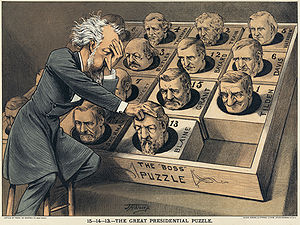
An 1880 political cartoon depicts Senator Roscoe Conkling over a "presidential puzzle" consisting of some of the potential Republican nominees as pieces of a newly invented sliding puzzle. Conkling held significant influence over the party during the 1880 Republican National Convention and attempted to use that to nominate Ulysses S. Grant, only to lose out to "dark horse" candidate James A. Garfield.
Selected quote
Selected biography
Ed Stelmach (born 1951) was the Premier of Alberta, Canada, from December 14, 2006 to October 7, 2011. He spent his entire pre-political adult life as a farmer, except for some time spent studying at the University of Alberta. His first foray into politics was a 1986 municipal election, when he was elected to the county council of Lamont County. A year into his term, he was appointed reeve. He continued in this position until his entry into provincial politics. In the 1993 provincial election, Stelmach was elected as the Member of the Legislative Assembly for Vegreville-Viking. A Progressive Conservative, he served in the cabinets of Ralph Klein. When Klein resigned the party's leadership in 2006, Stelmach was among the first to run to replace him. After a third place finish on the first ballot of the leadership race, he won an upset second ballot victory over former provincial treasurer Jim Dinning. Stelmach's premiership has been heavily focused on management of the province's oil reserves, especially those of the Athabasca Oil Sands. Other policy initiatives have included commencing an overhaul of the province's health governance system, a re-introduction of all-party committees to the Legislature, and the conclusion of a major labour agreement with Alberta's teachers.
Did you know (auto-generated) -

- ... that valence populism cannot be positioned on the left–right political spectrum?
- ... that the party leader of the new Dutch youth political party LEF – For the New Generation tattooed his party's program points on his forearm?
- ... that in the 1916 Declaration of Sainte-Adresse Britain, France and Russia committed to securing the political and economic independence of Belgium after the First World War?
- ... that after criticizing the political patronage system, John Silva Meehan was hired as Librarian of Congress through "purely an act of political patronage"?
- ... that the Citizens for Sanity political action committee, opposing "woke insanity", ran ads saying "vote progressive this November"?
- ... that Nirmalendu Goon shared his doubts about Sheikh Mujibur Rahman's political decisions during the 1969 East Pakistan mass uprising in his poem Huliya?
More did you know...
- ...that the first phase of Mitt Romney's 2012 U.S. presidential campaign was announced via a video message?
- ...that four member states of the European Union have de jure opt-outs and do not participate fully in all common policies?
- ...that Cornelius, Oregon is named after pioneer Thomas R. Cornelius, who served in both the Territorial and State legislatures?
- ...that the Society of the Friends of Peasants had significant influence on the Danish Constitution of 1849?
- ...that just before the invasion of Poland, members of the German minority from Deutscher Volksverband were trained in sabotage by the Abwehr agents arriving in Poland from Germany?
- ...that during the Sixth Congress of the Cuban Communist Party, Raúl Castro proposed term limits for the country's leaders?
In this month
- January 1, 1912 – The Republic of China was proclaimed.
- January 4, 2011 – Tunisian street vendor Mohamed Bouazizi dies after setting himself on fire a month earlier, sparking anti-government protests in Tunisia and later other Arab nations. These protests become known collectively as the Arab Spring.
- January 5, 1912 – Vladimir Lenin and the Bolshevik Party break away from the rest of the Russian Social Democratic Labour Party.
- January 12, 1729 – Edmund Burke was born, considered to be the philosophical founder of modern conservatism.
- January 25, 2006 – Hamas wins a victory in the Palestinian legislative election, taking 76 of the 132 seats.
News and Current events
- August 11: 4 local government areas in New South Wales, Australia locked down after COVID-19 case
- August 11: Australia: AstraZeneca vaccine access expanded by Victorian government
- August 1: Australia: Victorian lockdown lifted
- July 29: Tunisia's president dismisses prime minister, suspends parliament
- July 25: Australia: Wikinews interviews Reg Kidd, mayor of the City of Orange, about COVID-19 lockdown and local government
- July 23: South Australia enters week-long lockdown to contain COVID-19 Delta variant spread
- July 21: Technological University Dublin senior lecturer Dr Lorcan Sirr speaks to Wikinews on housing market in Ireland
- July 21: Three rural councils in New South Wales, Australia enter 7-day lockdown
- July 21: Australia: Victoria lockdown extended by a week with 85 active cases recorded
- July 15: California governor signs new state budget, eligible Californians to get stimulus payments
Topics and categories
General images
Related portals
Associated Wikimedia
The following Wikimedia Foundation sister projects provide more on this subject:
-
Commons
Free media repository -
Wikibooks
Free textbooks and manuals -
Wikidata
Free knowledge base -
Wikinews
Free-content news -
Wikiquote
Collection of quotations -
Wikisource
Free-content library -
Wikiversity
Free learning tools -
Wiktionary
Dictionary and thesaurus
